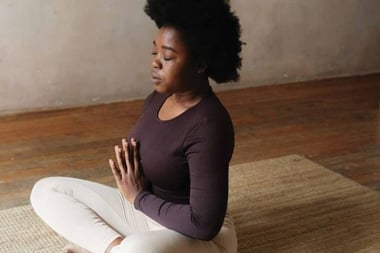
The men in a woman’s life can make a huge difference in helping her navigate through the emotional and physical changes associated with menopause. This is a time during which wives, sisters, mothers, and friends are going through important transformations, and more men are taking notice.
The hormonal roadmap
Women experience profound reproductive and hormonal shifts during the menopausal transitions, and every woman’s experience is different.
Perimenopause is the transition that starts this process and can begin up to 8 years before the final period. Most women experience their final period between the ages of 45 and 55, but there is a great deal of variation.
Menopause is reached when a woman has not had a period or spotting for a full year.
Postmenopause describes the time after that year during which some women may continue to experience symptoms associated with menopausal hormonal shifts.
Nearly all women seek help for menopause symptoms
According to a study published in Climacteric: The Journal of the International Menopause Society, “Menopausal symptoms are highly prevalent; they are sufficiently bothersome to drive almost 90 percent of women to seek out their healthcare provider for advice on how to cope.”
Menopause—what’s happening?
Women are born with a finite number of eggs or follicles in their ovaries. During perimenopause, as the number of follicles is depleted, there is less consistent ovulation, resulting in variability in hormonal levels. “This profound variation of hormonal highs and lows contributes to the symptoms that surface during perimenopause,” says Samantha Gray, ND, RAc.
Noticing the symptoms
These hormonal changes can manifest in many ways, and the symptoms they cause, including the following, can impact a woman’s well-being:
- hot flashes and night sweats causing intense body heat, sweating, or flushed skin
- mood swings with irritability and feelings of anxiety, depression, and sadness
- vaginal dryness, which may lead to discomfort during sex or urinary issues
- brain fog, impacting focus and memory, making daily tasks feel more challenging
- changes in appearance with dry skin, thinning hair, and increase in facial hair
- weight gain and body shape fluctuations particularly around the abdomen that disrupt personal comfort and confidence
With all of this going on, the capacity for a woman to manage what used to be “normal” for her can shift, and that can be confusing for a partner. “Stress tolerance [may] alter, and you may notice the women in your life are coping differently, or not coping, and that’s because their threshold changes,” says Gray.
What do men think?
When presented with a list of their female partner’s symptoms, such as tiredness, low libido, mood swings, and hot flashes, only 26 percent of men attributed those symptoms to menopause.
So how can men help?
Learn about menopause
Knowing how menopause affects women’s health can help men be more compassionate and less likely to dismiss what she’s experiencing. The Canadian Menopause Society and the Menopause Foundation of Canada are good resources.
Show compassionate interest
Ask questions, such as: “I’ve been reading about menopause―it seems women can have very different experiences; what is it like for you right now?”
Embrace physical changes
Hormonal fluctuations may bring changes to a woman’s skin, muscles, and body. It’s common to experience some grief and sadness in the face of these changes, and a partner’s tenderness and love can make a difference. “Our culture has a very rigid definition of beauty,” says Gray. “Redefining that beauty together, and knowing she is still beautiful in the eyes of the men in their life can help.”
Support mental health
Be flexible and willing to adapt to what she needs. Try offering help around the house, errands, and daily tasks to ease her load. As well, men can help keep the home environment calm, which in turn can alleviate mood swings.
“Know the women in your life,” says Gray. “Some women enjoy being open and can laugh about the challenges, while others are sensitive and may find all of this very difficult to handle.”
Interestingly, studies show that women in societies that are more accepting of menopause and no longer observe strict gender roles report fewer symptoms. This suggests that how this stage of life is perceived among those in a woman’s support network matters to the overall picture.
Embrace lifestyle changes
Accepting and embracing healthy lifestyle changes can reduce tension in relationships and can help both partners through menopause and beyond. “Lifestyle choices they make together will help with these efforts. In partnerships, a man accepting his own aging and how life is also shifting for him helps the two change together,” says Gray.
Examples of healthy lifestyle choices can include engaging in meditation, walking, or yoga; eating nutrient-dense foods; spending time in nature; and minimizing alcohol, says Gray. “As well, weight-bearing exercise supports bone and muscle health, and is a key way to manage symptoms.”
Be patient, listen, and validate her experience
Acknowledging the challenges of menopause can help women feel understood and supported and, importantly, more willing to continue sharing so the communication stays open. In partnerships, intimacy and connection can look and feel different than it did in the past, and it can affect sexual desire and function. A woman’s response to, and desire for sex is also highly variable during this decade of transition.
Have open discussions about how both of you can maintain closeness without pressure. “Stay in dialogue, exercise compassion, and remember her experience will keep changing,” says Gray. “Change and adapt with her.”
Support decisions
Ultimately, menopause is a woman’s journey, and how she wants to manage it is her decision. Although it’s important to be involved in discussing options and exploring different treatments, respecting her decisions is the best support you can offer. Says Gray, “The two of you will be stronger together.”
Male “menopause”
Although on average, testosterone levels in men drop about 1 percent per year after the age of 40, the change is so gradual that many don’t experience any physical changes. Some symptoms attributed to lower testosterone levels, though, can include reduced sexual desire, erectile dysfunction, infertility, and height and hair loss. It may also impact mood, energy, concentration, sleep, muscle bulk, and body fat.
Men can slow the drain by getting enough sleep and regular exercise, along with maintaining a healthy weight by focusing on a healthy whole foods diet. Supplements may also help with potential symptoms of lower testosterone levels.
|
Supplements |
Potential benefits |
|
valerian |
may help reduce the time to fall asleep and improve total sleep time |
|
magnesium |
is a critical component of our skeleton; may help boost testosterone levels |
|
ashwagandha |
may encourage feelings of “sexual well-being” and increase testosterone levels |
|
omega-3s |
in fish oils have inflammation-modulating capacity; may help support healthy muscle mass |
|
zinc |
plays a part in regulating testosterone levels |
|
rhodiola |
adaptogenic herb may help reduce stress-related fatigue and improve mood |
This article was originally published in the June 2025 issue of alive magazine.





